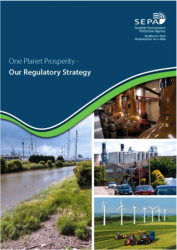The Scottish Environment Protection Agency (SEPA) has published a regulatory strategy, titled ‘One Planet Prosperity’, detailing its vision for a greener future.
According to the document, SEPA will ‘set about the essential task of helping regulated businesses to reduce water use, carbon-based energy use, materials use and all forms of waste and pollution beyond compliance standards’.
The strategy emphasises the need for ambitious goals, claiming that ‘real progress’ can only happen with a focus on helping as many as possible move ‘beyond compliance’. The document reads: “The most successful businesses in the future will be those that are not just compliant, but those which are also low carbon, low materials use, low water use and low waste.”

The regulator also claimed it will take firm action ‘including the effective and proportionate use of our new enforcement powers, against persistent offenders and environmental criminals’, adding it ‘will continue to focus on waste crime through partnership working with other enforcement agencies to disrupt serious organised crime’.
SEPA said it will develop a sector plan for each sector it regulates, developed via engagement with the sectors, relevant regulators and other key stakeholders.
In 2014, the Scottish Parliament passed the Regulatory Reform (Scotland) Act, which gives SEPA a new statutory purpose. SEPA considers its statutory purpose to be to protect and improve the environment in ways that, as far as possible, create “health and well-being benefits (social success); and sustainable economic growth (economic success).”
As such, the SEPA emphasises the importance of regulating businesses ‘in ways that improve their profitability and long-term viability’.
Terry A’Hearn, SEPA’s chief executive, said that under the new strategy SEPA will make two key contributions to making Scotland stronger: “First, we will more quickly and powerfully get all Scottish businesses meeting the environmental laws in Scotland.
“Second, we will help as many Scottish businesses as possible go even further, helping them find profitable ways to go beyond what the law requires in reducing their use of energy, water and materials and the amount of waste they produce.”





